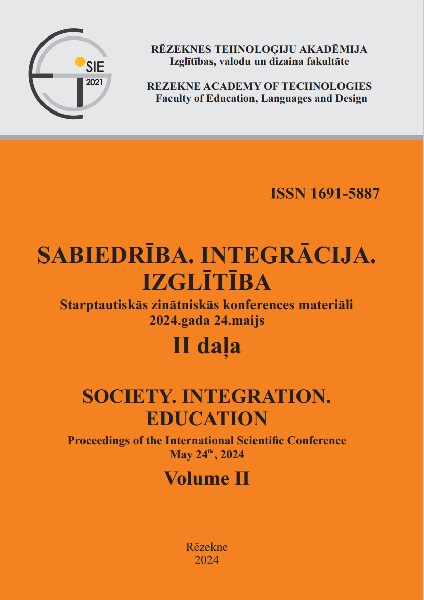EDUCATIONAL ISSUES IN THE RESOCIALIZATION PROCESS OF CRIMINAL OFFENDERS
DOI:
https://doi.org/10.17770/sie2024vol2.7835Keywords:
criminality, education, imprisonment, integration into society, offenders, reintegration, resocializationAbstract
The primary focus of the research is to investigate educational challenges in the process of resocializing individuals with criminal tendencies. The research aims to analyze educational issues in the resocialization process of offender to facilitate a more effective resocialization of criminally inclined individuals into society. The research tasks encompass various key objectives, including the analysis of offender characteristics, exploration of the formation process of offender personalities, formulation of proposals to mitigate the negative impact of macro-environmental factors, and development of resocialization recommendations. The novelty of the research is linked to changes in cultural values and social norms influencing the behavior, motivation, and transformation of social values among criminally inclined individuals. The outcomes of the research will contribute to the development of more effective strategies for crime prevention and the resocialization of offender personalities within society. The chosen research methods will provide a comprehensive insight into the formation of offender personalities and the factors influencing them. The monographic method will be utilized to describe existing research findings and provide conceptual explanations regarding offender personality and its formation mechanisms. The comparative method will be applied to assess issues related to the prevention of criminal activities among criminally inclined individuals in Latvia and other countries.
References
Azemi, F. (2020). The impact of the prison environment on behavioral changes of inmates: a study of inmates in Kosovo and Finland. Journal of Criminological Research, Policy and Practice. Bingley Vol. 6, Iss. 2, 123-136. DOI:10.1108/JCRPP-01-2020-0010
Becker Pestka, D. (2020). Meaning and meaninglessness of education for convicts. Selected aspects of education for convicts in Poland and in Europe. Social Sciences & Humanities Open. Volume 2, Issue 1. DOI: https://doi.org/10.1016/j.ssaho.2020.100053
Forsberg, L., Thomas, D. (Apr 2022). What is Criminal Rehabilitation? Criminal Law and Philosophy. Dordrecht. Vol. 16, Iss. 1, 103-126. DOI:10.1007/s11572-020-09547-4
Kakupaa P., Mpundu Mulenga K., (2021). Does correctional education matter? Perspectives of prisoners at a male adult maximum-security prison in Zambia. International Journal of Educational Research Open. Volume 2. DOI: https://doi.org/10.1016/j.ijedro.2021.100090
Legodi, R.; Dube, M. (2023). Community Reintegration of Offenders at an Overcrowded Rural Correctional Facility. Work Experiences of Correctional Officials Social Sciences. Basel. Vol. 12, Iss. 9: 489. DOI:10.3390/socsci12090489
Mārtinsone, K. un Pipere, A. (2021). Zinātniskās darbības metodoloģija: starpdisciplināra perspektīva. Rīga; RSU, 608.lpp.
Ministru kabinets. (2022). Ministru kabineta rīkojums Nr. 413, (2022. gada 13. jūnijā). Resocializācijas politikas pamatnostādnes, 2022.–2027. Rīgā, (prot. Nr. 30 26. §). Iegūts no: https://likumi.lv/ta/id/333223-par-resocializacijas-politikas-pamatnostadnem-2022-2027-gadam.
Ministru kabinets. (2023). Ministru kabineta noteikumi Nr. 726. (2023. gada 5. decembrī). Eiropas Savienības kohēzijas politikas programmas 2021.–2027. gadam 4.3.4. specifiskā atbalsta mērķa "Sekmēt aktīvu iekļaušanu, lai veicinātu vienlīdzīgas iespējas, nediskriminēšanu un aktīvu līdzdalību, kā arī uzlabotu nodarbināmību, jo īpaši attiecībā uz nelabvēlīgā situācijā esošām grupām" 4.3.4.7. pasākuma "Nodarbināmības priekšnosacījumu nodrošināšana ieslodzītajiem, pilnveidojot resocializācijas sistēmas efektivitāti, sekmējot bijušo ieslodzīto iekļaušanos, vienlīdzīgas iespējas un aktīvu līdzdalību" īstenošanas noteikumi (prot. Nr. 60 65. §). Rīgā.
Mohd Azam, S.B., Abu Bakar, S.H., Mohd Yusoff, J.Z., Abdul Rauf, S.H., (2021). A case study on academic and vocational training for child offenders undergoing a multisystemic therapy-based rehabilitation order in Malaysia. Children and Youth Services Review, Elsevier, vol. 122(C). DOI: https://doi.org/10.1016/j.childyouth.2020.105911
Neagu, C. M. (2019). Considerations on re-socialisation, social reinsertion and recovery through education. Challenges of the Knowledge Society. Bucharest, (144-148).
Nicolaescu, E.-P. (Autumn 2021). Dynamics of personality factors involved in juvenile delinquency. Journal of Comparative Research in Anthropology and Sociology. Bucharest, Vol. 12, Iss. 1, 31-43.
Pocius, A. (2007). Concept of the Criminal Personality in the Context of Criminological Concepts of Russian Authors. Jurisprudencija. Vilnius, Vol. 95, Iss. 5.
Saeima. (1999). Krimināllikums: Latvijas Republikas likums. Latvijas Vēstnesis. Iegūts no: https://likumi.lv/ta/id/88966-kriminallikums
Saeima. (2004). Valsts probācijas dienesta likums: Latvijas Republikas likums. Latvijas Vēstnesis. Iegūts no: https://likumi.lv/ta/id/82551-valsts-probacijas-dienesta-likums
Surgenor, Lois J; Diesfeld, Kate; Rychert, Marta, (2023). Practitioner Rehabilitation following Professional Misconduct: A Common Practice Now in Need of a Theory? Laws. Basel. Vol. 12, Iss. 3, 59. DOI:10.3390/laws12030059
Tuominen, T., Korhonen, T., Hämäläinen, H., Temonen, S., Salo, H., et al.. (2014). Functional illiteracy and neurocognitive deficits among male prisoners: implications for rehabilitation. Journal of Forensic Practice. Brighton, Vol. 16, Iss. 4: 268-280. DOI:10.1108/JFP-10-2013
Valsts probācijas dienests. (2020). Valsts probāciju dienests infogrāfiskais materiāls. Iegūts no: https://www.vpd.gov.lv/lv/macibu-prakses-iespejas-valsts-probacijas-dienesta
Ward, T., Durrant, R., & Sullivant, J. (2019). Understanding crime: A multilevel approach. Psychology, Crime & Law. 25(6), 709-711. DOI: https://doi.org/10.1080/1068316X.2019.1572754
World Health Organization, (2023). Rehabilitation. Pieejams: https://www.who.int/news-room/fact-sheets/detail/rehabilitation






